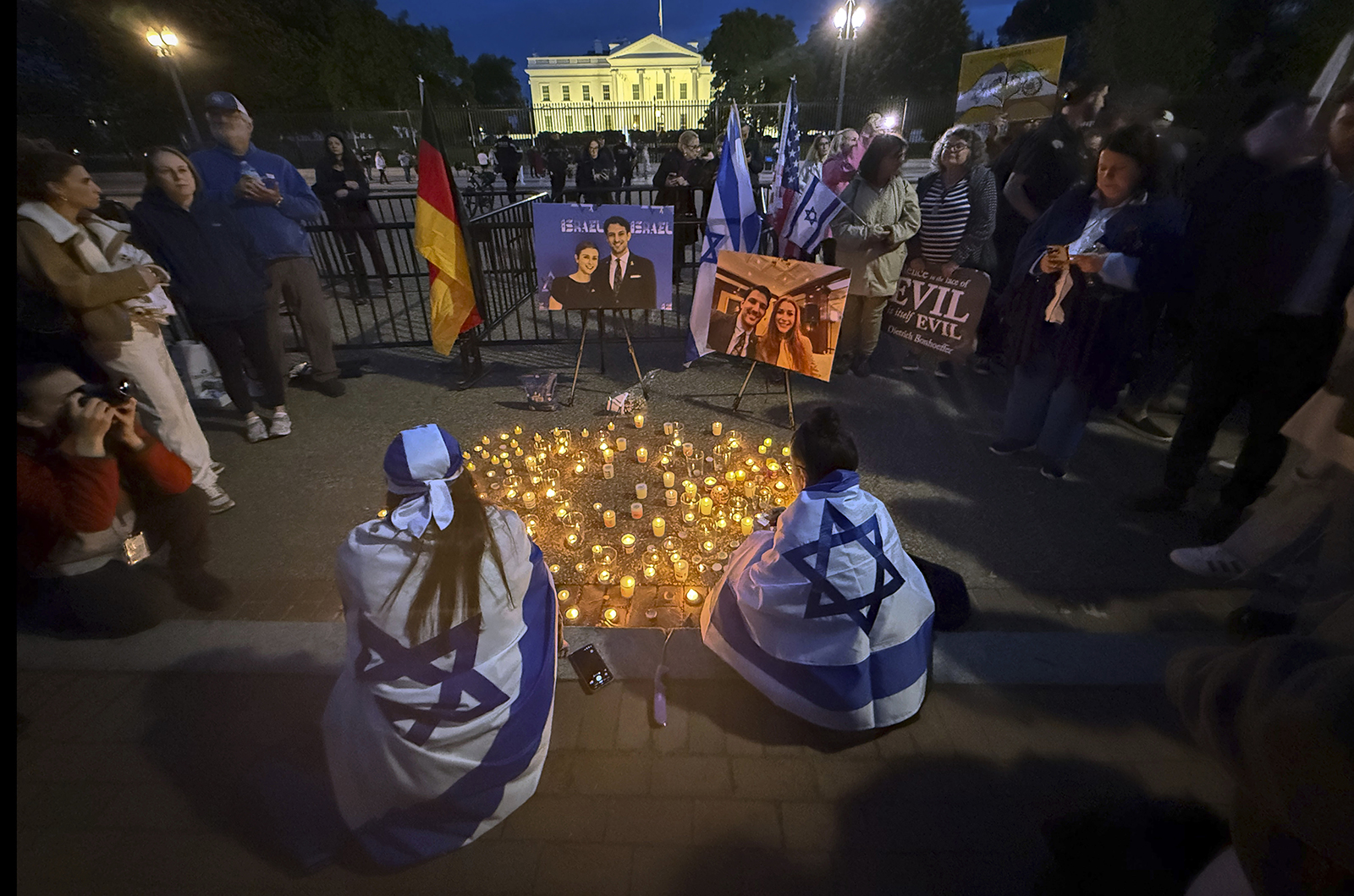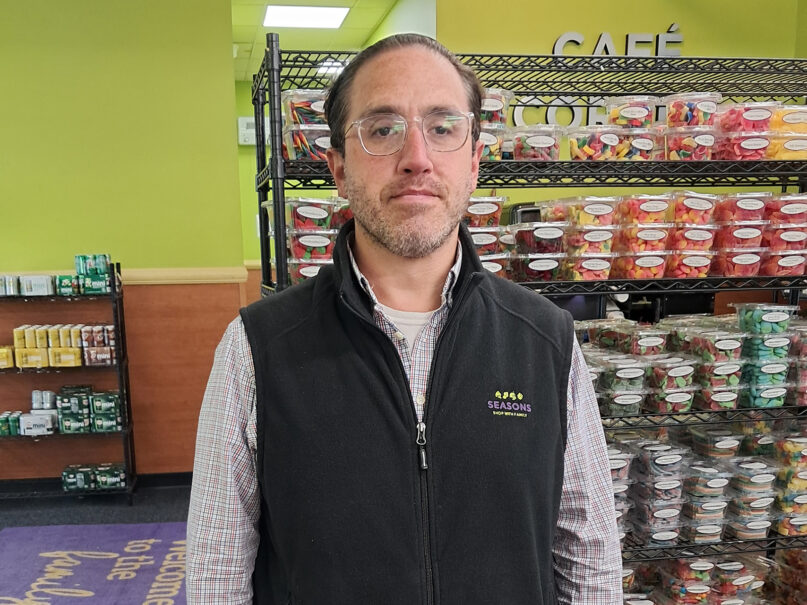
(RNS) — American Jewish communities are rushing to bolster already heightened security around their institutions and businesses after the May 21 killings of two Israeli Embassy staffers outside the Capital Jewish Museum in Washington, D.C.
The attack in Washington “solidifies that we cannot be lax” about security, said Avram Klein, general manager of Seasons, a popular kosher supermarket in Queens, New York.
“When you go food shopping you shouldn’t have to worry about your safety and whether to bring your kids with you,” Klein said.
Since the Oct. 7, 2023, Hamas massacre that triggered the Israel-Hamas war and a sharp rise in antisemitic incidents worldwide, the store has installed additional surveillance cameras and hired onsite security guards, Klein said.
Sarah Milgrim, 26, an American Jew, and Yaron Lischinsky, 30, an Israeli Christian, were gunned down in the street outside the museum, where they had just attended an event sponsored by the American Jewish Committee about ways to increase humanitarian aid to Palestinian civilians in Gaza. The suspect, Elias Rodriguez, was caught on film shouting “Free, Free Palestine,” while he was being arrested, and said he killed the couple “for Gaza,” according to media reports. Israel has been accused of committing genocide against Palestinians, which Israel vehemently denies.
The day after the attack, which the FBI labeled “targeted antisemitic violence,” 44 Jewish organizations called on Congress and U.S. federal agencies to increase security-related funding to Jewish institutions.

Law enforcement officers work the scene May 22, 2025, after two staff members of the Israeli Embassy in Washington were shot and killed outside the Capital Jewish Museum in Washington. (AP Photo/Rod Lamkey Jr.)
Antisemitic attacks against Jews and Jewish institutions, which had already been increasing before Oct. 7, have skyrocketed since, according to the FBI.
“What happened last night did not happen in a vacuum,” Holly Huffnagle, U.S. director for combating antisemitism at AJC, told RNS after the attack. “For years, we have witnessed the toxic buildup of the demonization of Jews and Israelis. Since the Hamas terrorist attack on Oct. 7, 2023, antisemitism has increased globally, and especially online and on social media, with dangerous, real-life consequences for Jews and the democracies in which we live. When people chant slogans about murder, when they take the side of terrorists, when they march in the street calling for violence, this is the outcome.”
In their May 22 statement, the Jewish organizations asked Congress to vastly increase to $1 billion the amount of funding the government provides to the Nonprofit Security Grant Program, which gives grants to nonprofit organizations believed to be “at high risk of terrorist attacks” and includes religious institutions such as synagogues, Jewish community centers and Jewish day schools. In 2024, the program received $274.5 million, down from $305 million in 2023. Last year, only 43% of applicants received funding, according to the statement.
The organizations that signed on, including AJC, AIPAC and the Conference of Presidents of Major Jewish Organizations, also asked the U.S. government to fund the hiring of more security guards to protect Jewish schools, community centers and summer camps, among other venues, and to enable the FBI and local police and law enforcement to better protect Jewish institutions and thwart domestic terrorism.
Finally, they called on the government to “aggressively prosecute antisemitic hate crimes and extremist violence in accordance with the law,” and to hold social media, gaming and other platforms accountable for the “amplification of antisemitic hate, glorification of terrorism, extremism, disinformation and incitement.”
Given the heightened security already in place, some Jewish leaders and security professionals were alarmed the suspect was able to enter the museum building after the shooting.
“What concerned me as a seasoned law enforcement official is in all the work and the efforts that we put into training civilians, his behavior was almost literally screaming that there’s an issue here,” Paul Goldenberg, the chief policy adviser and head of global policing at Rutgers University’s Miller Center on Policing, told The Forward.
“The second he walked in after the shooting there should have been a plan,” said Goldenberg, a former leader of the Secure Community Network, which spearheads security for many Jewish institutions around the U.S., according to The Forward. “If we know that he just shot individuals outside, whatever security was in place, he never should have made it inside that building.”
Five Jewish groups involved with security quickly issued recommendations for future events in the Jewish sphere, the Jewish Telegraphic Agency reported. Suggestions included hiring more security guards, coordinating the details of events with law enforcement, vetting attendees and expanding the security perimeter.

Avram Klein, the general manager of Seasons kosher supermarket in New York City’s Queens borough, said the shop has tightened security since Oct. 7, 2023, and will be especially vigilant after the shooting of two Israeli Embassy employees May 21, 2025, outside a Jewish museum in Washington, D.C. (Photo by Michele Chabin)
Ron Halber, CEO of the Jewish Community Relations Council of Greater Washington, emphasized that there is a limit to the amount of security that any Jewish institution can muster.
“Resources are finite,” Halber told JTA. “There’s no blame to AJC on this. But how far can you extend the perimeter? One block, two blocks?”
Rabbi Rick Jacobs, president of the Union for Reform Judaism, told RNS he believes that safeguarding Jews and Jewish institutions “should be our society’s burden, our country’s burden.” As such, resolving antisemitism should be addressed by the highest levels of government, he said.
Jews should not be expected to risk their lives in order to participate in community events, Jacobs said.
“I don’t know of a single Jewish institution that doesn’t have a security protocol and won’t be reevaluating its security in the coming days,” he said. “We already ensure that our buildings and events are as safe as possible. Yet it did happen, even with all the cooperation with law enforcement and security measures.”
Rabbi Moshe Hauer, executive vice president of the Orthodox Union, said Orthodox Jews and congregations under the OU’s umbrella “are on edge.”
“Our synagogues have strong security routines at this point, and they understand the need for increased vigilance,” he said. “But it’s critical that life and Jewish life goes on after this terrible event.”
Hauer said attempts to intimidate American Jews will never succeed.
“The Jewish community is committed to holding its ground,” he said.
